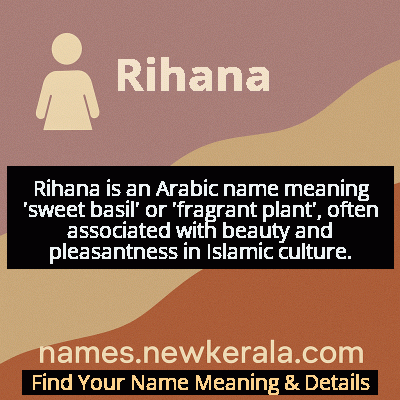Rihana Name Meaning & Details
Origin, Popularity, Numerology Analysis & Name Meaning of Rihana
Discover the origin, meaning, and cultural significance of the name RIHANA. Delve into its historical roots and explore the lasting impact it has had on communities and traditions.
Name
Rihana
Gender
Female
Origin
Muslim
Lucky Number
6
Meaning of the Name - Rihana
Rihana is an Arabic name meaning 'sweet basil' or 'fragrant plant', often associated with beauty and pleasantness in Islamic culture.
Rihana - Complete Numerology Analysis
Your Numerology Number
Based on Pythagorean Numerology System
Ruling Planet
Venus
Positive Nature
Harmonious, responsible, caring, and artistic.
Negative Traits
Overly idealistic, superficial, possessive, or jealous.
Lucky Colours
Pink, turquoise.
Lucky Days
Friday.
Lucky Stones
Diamond, turquoise.
Harmony Numbers
2, 3, 9.
Best Suited Professions
Artists, musicians, teachers, healthcare workers.
What People Like About You
Warmth, nurturing nature, artistic flair.
Famous People Named Rihana
Rihanna
Singer, Actress, Businesswoman
Barbadian superstar with 9 Grammy Awards, founder of Fenty Beauty cosmetics line
Rihana bint Abdullah Al Saud
Saudi Royal Family Member
Prominent member of Saudi royal family known for philanthropic work
Rihana Obaid
Academic Researcher
Notable researcher in Middle Eastern studies and women's education
Name Variations & International Equivalents
Click on blue names to explore their detailed meanings. Gray names with will be available soon.
Cultural & Historical Significance
Extended Personality Analysis
Women named Rihana are typically characterized by a beautiful balance of strength and gentleness that makes them both resilient and approachable. They often possess natural empathy and emotional intelligence, allowing them to understand and connect with people from diverse backgrounds. Their nurturing nature resembles the comforting qualities of sweet basil, creating warm environments where others feel safe and valued. Rihanas tend to be deeply loyal to their loved ones and principles, demonstrating remarkable consistency in their relationships and commitments. They often exhibit creative talents and aesthetic sensibilities, with many excelling in artistic fields or roles requiring emotional depth. While generally diplomatic and peace-loving, they can display surprising determination when defending their beliefs or protecting those they care about. Their intuitive nature helps them navigate complex situations with wisdom beyond their years, and they often serve as trusted confidantes and advisors within their social circles. This combination of softness and inner strength makes Rihanas particularly effective in healing professions, education, and community leadership roles where both compassion and resilience are essential.
Modern Usage & Popularity
In contemporary naming practices, Rihana has evolved from a traditional Muslim name to an internationally recognized choice with cross-cultural appeal. While maintaining its strong roots in Islamic communities, the name has gained significant global visibility through Barbadian superstar Rihanna, though many parents prefer the traditional spelling to preserve cultural authenticity. Recent data shows Rihana ranking consistently in the top 150 names for Muslim girls in countries like Pakistan, Malaysia, and Egypt, with steady increases in usage across European and North American Muslim communities. The name's popularity reflects broader trends toward meaningful, culturally rich names that work well in multicultural societies. Social media platforms reveal vibrant communities of young Rihanas sharing their experiences, creating modern narratives around this ancient name. Educational institutions report growing numbers of Rihanas in diverse classrooms, indicating the name's successful transition into global multiculturalism while maintaining its traditional significance and spiritual connotations.
Symbolic & Spiritual Meanings
The symbolic meanings of Rihana extend far beyond its literal translation as 'sweet basil,' encompassing rich layers of metaphorical significance. Primarily, it represents divine protection and spiritual sanctuary, drawing from historical traditions where basil was used to safeguard homes and sacred spaces. The name symbolizes healing and restoration, reflecting the herb's centuries-old use in traditional medicine across Middle Eastern and South Asian cultures. Metaphorically, Rihana embodies the concept of resilience and adaptability - like the basil plant that flourishes in various environments while retaining its distinctive essence and fragrance. It represents the harmonious coexistence of strength and gentleness, suggesting that true power often manifests through nurturing and compassion rather than force. The name also carries connotations of purity and spiritual elevation, associated with the blessed plants mentioned in Islamic tradition. In contemporary interpretations, Rihana symbolizes cultural pride and the beautiful integration of traditional values with modern identity, making it particularly meaningful for families navigating multiple cultural contexts while maintaining their heritage.

